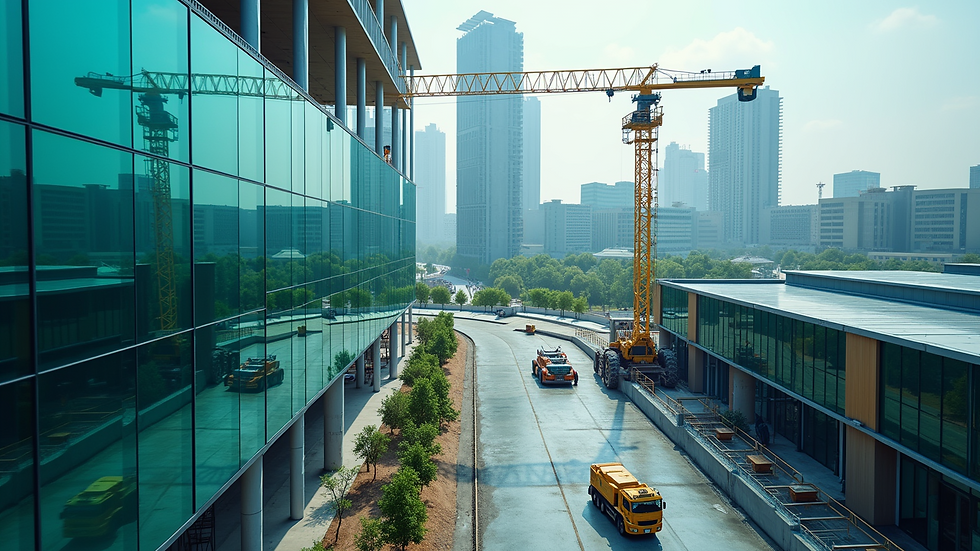Top FAQs About Custom Home Builders
- Mr Engineer
- Oct 17, 2025
- 4 min read
Building a home is one of the most significant investments you can make. It’s a journey that combines creativity, technical expertise, and a vision for the future. As someone deeply involved in sustainable engineering and AI-driven solutions, I understand the importance of asking the right questions before embarking on this journey. Whether you’re a builder, architect, developer, or business owner, knowing what to expect from your custom home builder can transform your project into a smarter, more efficient, and sustainable success.
In this post, I’ll address the most common questions about custom home builder questions, focusing on innovation, sustainability, and practical insights that empower you to make informed decisions.
Why Choose a Custom Home Builder Over a Traditional Builder?
Choosing a custom home builder means opting for a tailored approach to your home construction. Unlike traditional builders who often work with pre-designed plans, custom home builders collaborate closely with you to create a home that fits your unique needs, lifestyle, and sustainability goals.
Key benefits include:
Personalized design: Every detail, from layout to finishes, is crafted to your preferences.
Energy efficiency: Custom builders integrate advanced materials and technologies to reduce energy consumption.
Smart home integration: AI and automation systems can be seamlessly incorporated for enhanced comfort and control.
Sustainability focus: Custom homes often use eco-friendly materials and construction methods that minimize waste.
For example, integrating solar panels and smart thermostats during the design phase can significantly reduce your home's carbon footprint and energy bills.

Innovative design combining sustainability and technology
What Are the Most Important Custom Home Builder Questions to Ask?
When engaging with a custom home builder, asking the right questions ensures your project stays on track and meets your expectations. Here are some essential questions to consider:
What experience do you have with sustainable building practices?
Understanding their expertise in eco-friendly materials and energy-efficient designs is crucial.
How do you incorporate technology and automation in your builds?
This reveals their ability to integrate smart home systems and AI-driven solutions.
Can you provide examples of past projects similar to mine?
Reviewing their portfolio helps gauge their style and quality.
What is your process for managing timelines and budgets?
Transparency here prevents surprises and delays.
How do you handle communication and updates during construction?
Efficient communication tools and automation can streamline this process.
What warranties and post-construction support do you offer?
Ensures peace of mind after your home is completed.
By asking these questions, you can assess whether the builder aligns with your vision and sustainability goals.

Combining traditional plans with digital technology for precision
How Does Sustainability Influence Custom Home Building?
Sustainability is no longer an option but a necessity in modern construction. Custom home builders are uniquely positioned to lead this transformation by integrating sustainable engineering principles from the ground up.
Key sustainability strategies include:
Passive design: Orienting the home to maximize natural light and ventilation reduces reliance on artificial heating and cooling.
High-performance insulation: Advanced materials keep the home comfortable year-round with less energy.
Water efficiency: Rainwater harvesting and greywater recycling systems reduce water waste.
Renewable energy: Solar panels, wind turbines, or geothermal systems can power your home sustainably.
Waste reduction: Prefabrication and precise material planning minimize construction waste.
For instance, a home designed with passive solar principles can reduce heating costs by up to 30%, demonstrating how engineering expertise directly benefits both the environment and your wallet.

Eco-friendly materials being used on a sustainable construction site
What Role Does AI Technology Play in Custom Home Building?
Artificial intelligence is revolutionizing the way homes are designed, built, and managed. Custom home builders who embrace AI can offer smarter, more efficient solutions that enhance every stage of the process.
Applications of AI in custom home building include:
Design optimization: AI algorithms analyze site conditions, climate data, and user preferences to create optimal floor plans.
Project management: Automated scheduling and resource allocation reduce delays and cost overruns.
Energy management: Smart systems learn your habits and adjust lighting, heating, and cooling for maximum efficiency.
Quality control: AI-powered sensors monitor construction quality in real-time, catching issues early.
Customer communication: Chatbots and automated updates keep you informed without manual effort.
By leveraging AI, builders can deliver homes that are not only beautiful and functional but also intelligent and sustainable.
How Can I Ensure My Custom Home Project Stays Within Budget and Timeline?
Managing costs and timelines is a common concern in custom home building. Here are practical tips to keep your project on track:
Set clear priorities: Define what features and finishes are essential versus nice-to-have.
Choose experienced builders: Their expertise helps avoid costly mistakes and delays.
Use technology: Project management software and AI tools provide real-time updates and forecasts.
Plan for contingencies: Allocate a buffer for unexpected expenses or changes.
Communicate regularly: Maintain open lines with your builder to address issues promptly.
Opt for sustainable materials: While sometimes more expensive upfront, they often reduce long-term maintenance and energy costs.
For example, using prefabricated components can speed up construction and reduce labour costs, demonstrating how innovation supports budget control.
Empowering Smarter, Sustainable Homes for the Future
Building a custom home today means embracing transformation - from sustainable materials to AI-driven automation. By asking the right questions and partnering with knowledgeable professionals, you can create a home that reflects your vision while advancing energy efficiency and digital innovation.
If you want to explore more about how custom home builders are shaping the future of sustainable living, I encourage you to dive deeper into their expertise and solutions. Together, we can build smarter, greener homes that stand the test of time.

Completed smart home showcasing innovation and sustainability





Comments